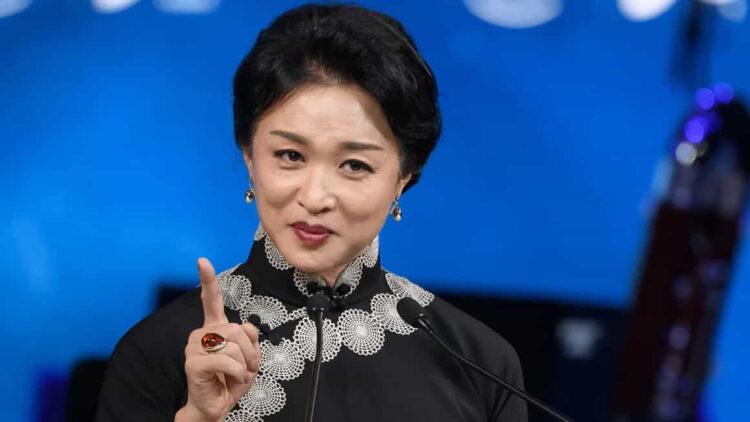Transgender Dancer Jin Xing’s Shows Canceled in China Amid Rising Fears of Crackdown
Warning: This article discusses LGBTQ+ issues and the challenges faced by the transgender community in China.
Jin Xing, a renowned transgender dancer, has long been an iconic figure in China’s entertainment industry. Her rise to fame is extraordinary in a country where LGBTQ+ individuals often face significant social stigma and discrimination. However, a recent wave of show cancellations has raised fears that her acceptance, which once seemed progressive, may now be under threat.
Jin Xing’s Career: A Symbol of Success and Acceptance
At 57, Jin has defied the odds as a successful transgender personality in a country where LGBTQ+ people still struggle with basic rights. Over the years, she has sold-out concerts, hosted popular TV shows, and amassed millions of followers on her Weibo social media account. She has also earned praise from some of China’s most influential figures, including Communist Party officials.
Her achievements in the arts, particularly modern dance, have led Chinese state media to praise her as one of “10 legendary figures of Chinese modern dance.” For many transgender people in China, Jin represents a rare example of success and societal acceptance, inspiring hope that China might one day embrace them fully.
Cyan, a 23-year-old transgender man who fled China for Canada, admires Jin’s courage. “I find her very admirable,” he told CNN, adding that he viewed Jin as an inspiration for those seeking acceptance in a society that often marginalizes them.
Show Cancellations Spark Fears of Political Crackdown
Despite her success, recent events have cast doubt on Jin’s future in China. In late 2023, her dance troupe’s performance in Guangzhou was canceled by the Municipal Bureau of Culture, Radio, Television, and Tourism, citing insufficient documentation. This cancellation was followed by the abrupt removal of her shows in other cities like Foshan, Suzhou, and Shanghai. Authorities provided no explanation for these sudden cancellations, but many speculated that Jin’s growing prominence as an openly transgender figure may have become a target under China’s increasingly authoritarian leadership.
Some in the transgender community are concerned that the cancellations signal a broader attempt to suppress LGBTQ+ visibility in China. “Things seem to have changed,” said Sam Winter, an academic expert on Asian transgender issues. “The earlier liberal shift in China may have been problematic for the current regime.”
Political Sensitivity and Censorship
Jin’s troubles with the authorities began after she posted a public challenge to the cancellation of her Guangzhou show, demanding an explanation for the decision. In her post, she warned officials not to “abuse public power.” Her boldness in confronting the government is rare in China, where speaking out against authority can lead to severe consequences.
Some have speculated that Jin’s actions may have crossed a line when she waved a “Love is Love” rainbow flag at a previous performance—a symbol closely associated with the global LGBTQ+ community. Chinese authorities have been increasingly suspicious of LGBTQ+ symbols, viewing them as a form of foreign influence. Jin herself has defended her actions, explaining that she waved the flag to comfort a fan who had handed it to her.
Still, the cancellation of her shows has many wondering whether the political climate in China is becoming less tolerant of LGBTQ+ visibility, even for someone as established as Jin.
Jin’s Rise: A Life of Adversity and Triumph
Jin Xing’s journey to fame was no easy feat. Born into a military family, she began dance training at a young age and eventually moved to New York to study modern dance. After undergoing gender-affirming surgery at age 26, she returned to China, where she founded the Jin Xing Dance Theatre in 1999. Despite enduring hardships—such as a period of temporary paralysis after surgery—Jin’s resilience allowed her to thrive in China’s competitive entertainment industry.
Over the years, Jin became a household name, known for her straight-talking TV appearances and humor. She was even dubbed “China’s Oprah” by The Hollywood Reporter for her ability to provide candid, insightful discussions while walking a fine line with authorities.
Jin’s remarkable career has not only helped modern dance gain a foothold in China but has also solidified her as one of the most successful transgender public figures in the country’s history.
The Struggles of Transgender People in China
Despite Jin’s success, the reality for most transgender individuals in China remains grim. Many face harsh discrimination, limited job prospects, and significant pressure to hide their identities. Gender-affirming surgeries are expensive, difficult to access, and come with numerous legal and social barriers.
Cyan, who moved to Canada for a better life, explained that living as a transgender person in China often feels like being a “street rat.” Many transgender individuals must conceal their true identities, living a “double life” to avoid discrimination. “During the day, they’re men. At night, they become women,” explained Barbie Yao, a 26-year-old trans woman living in Beijing.
Yao expressed concern that Jin’s recent troubles could signal worsening conditions for the LGBTQ+ community in China. “I knew things are going to happen this way,” she said. “The environment for LGBTQ+ people will get worse and worse.”
A Shifting Climate for LGBTQ+ Rights in China
Under President Xi Jinping, China has become more socially conservative and authoritarian, with a rising crackdown on LGBTQ+ visibility. Pride events have been canceled, LGBTQ+ support groups have been disbanded, and films with same-sex themes have been banned.
For Jin and other transgender individuals, these shifts are deeply concerning. While Jin’s place in Chinese culture remains significant, it is unclear whether the government will continue to allow her to perform and speak freely, especially as LGBTQ+ issues become increasingly politicized in China.
In the face of this uncertain future, Jin’s story stands as both a testament to how far the country has come in some areas and a stark reminder of the challenges that still lie ahead for transgender people in China.
This article was rewritten by JournosNews.com based on verified reporting from trusted sources. The content has been independently reviewed, fact-checked, and edited for accuracy, tone, and global readability in accordance with Google News standards.
Stay informed with JournosNews.com — your trusted source for verified global reporting and in-depth analysis. Follow us on Google News and BlueSky for real-time updates.
JournosNews.com follows Google News content standards with original reporting, verified sources, and global accessibility. Articles are fact-checked and edited for accuracy and neutrality.












